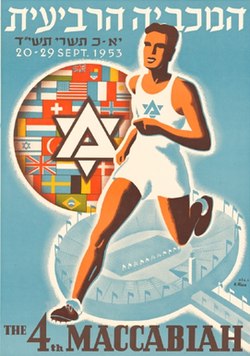Grant Golden was an American amateur tennis player in the 1940s and 1950s. Golden was ranked in the U.S. top 10 in singles in 1953, 1956, and 1957, and was ranked # 2 in the U.S. in doubles in 1953.
Anita Kanter is a former amateur tennis player from the U.S. who played in the 1950s. In singles, Kanter was ranked # 6 in the United States in 1952, and # 9 in the US in 1953.
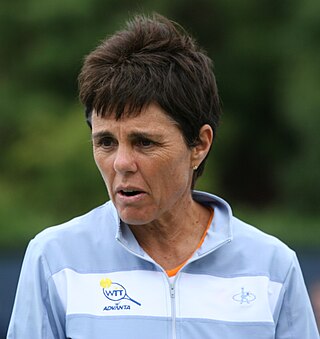
Ilana Sheryl Kloss is a South African former professional tennis player, tennis coach, and administrator. She was the World's No. 1 ranked doubles player in 1976, and World No. 19 in singles in 1979. She won the Wimbledon juniors singles title in 1972, the US Open juniors singles title in 1974, and the US Open Doubles and French Open Mixed Doubles titles in 1976. She won three gold medals at the 1973 Maccabiah Games in Israel. After her playing career, Kloss was the commissioner of World TeamTennis from 2001–2021.
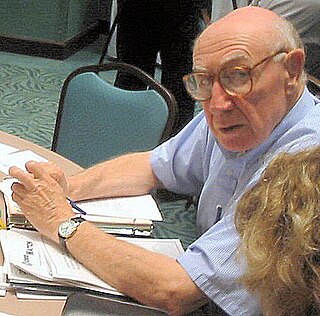
Pablo Samuel Eisenberg was an American scholar, social justice advocate, and tennis player. He played in Wimbledon five times, making the quarterfinals once, and won a gold medal at the 1953 Maccabiah Games in Israel. He was a Senior Fellow at Georgetown University's Public Policy Institute. Prior to his role at Georgetown, he served for 23 years as executive director of the Center for Community Change, a progressive community organizing group.

Allan Louis Neville Jay MBE was a British five-time-Olympian foil and épée fencer, and world champion.
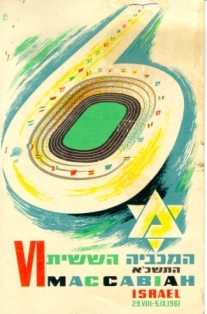
The 6th Maccabiah Games were held in Tel Aviv, Israel in 1961, with 1,100 athletes from 27 countries competing in 18 sports. The Games were officially opened in an Opening Ceremony on August 29, 1961, in Ramat Gan Stadium by Israeli President Yitzhak Ben-Zvi before a crowd of 30,000. The closing ceremony took place on September 5, 1961, at the stadium before a crowd of 40,000, with Israeli Prime Minister David Ben Gurion telling the crowd that he hoped that in the future athletes from North Africa, Poland, Hungary, Czechoslovakia, and the Soviet Union would also compete. The United States won 58 gold medals, Israel won 28 gold medals, and South Africa was third with 11 gold medals. American sportscaster Mel Allen narrated a film about the 1961 Games.

At the 10th Maccabiah Games in Israel, more than 2,800 athletes from 34 countries participated in 26 different sports, including chess and bridge and for the first time badminton.
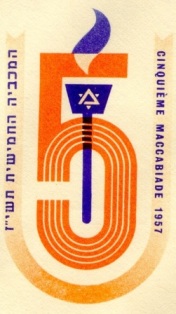
Twenty-one countries sent 980 athletes to compete in the 1957 5th Maccabiah Games, an international Jewish athletics competition similar to the Olympics. The opening ceremony on September 15, 1957, was held in Ramat Gan Stadium, with athletes parading before Israeli President Yitzhak Ben Zvi.
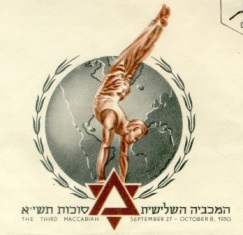
The 3rd Maccabiah took place during Sukkot from September 27 to October 8, 1950, with 17 countries competing. It was the third edition of the Maccabiah Games and the first held since the independence of the State of Israel; 15 years after the previous Maccabiah. Israel won the 1950 Maccabiah Games, Great Britain was second, South Africa third, the United States fourth, Canada fifth, and Austria sixth.

The 11th Maccabiah Games brought 3,450 athletes to Israel from 35 nations. The Opening Ceremony was held on July 7, 1981, before a crowd of 53,000 and Israeli Prime Minister Menachem Begin in Ramat Gan Stadium, with 3,500 Jewish athletes parading past him. Representative Jack Kemp and a supporter of Israel, marched with the United States team. Israel won the most medals (199), with 65 gold. The United States won 188 medals, 85 gold. South Africa, Britain, and Canada had the next-most total medals.
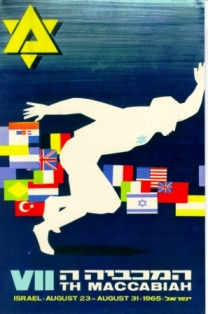
The 7th Maccabiah Games in 1965 saw 1,500 athletes from 29 different countries compete in 21 sports. It was the first Maccabiah Games for Iran, Jamaica, Peru, and Venezuela. The United States delegation won the most gold medals, followed by Israel, the United Kingdom, South Africa, Mexico and the Netherlands, Southern Rhodesia, Australia, Argentina and Italy, and Brazil, Canada, Denmark, and Sweden with one each.
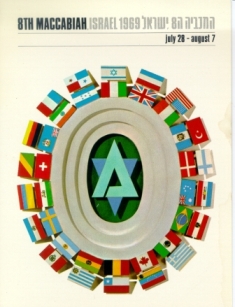
At the 8th Maccabiah Games from July 29 to August 7, 1969, 1,450 athletes from 27 countries competed in 22 sports in Israel. The final gold medal count was the United States in first place (64), Israel second, and Great Britain third (11).
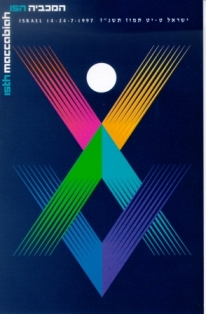
The 15th Maccabiah Games are remembered for being marred by a bridge collapse that killed several participants.

The 9th Maccabiah Games, which were held from July 9 to 19, 1973, were opened in Ramat Gan Stadium, Israel. Spain and Costa Rica made their debuts in the Games. A total of 1,800 athletes competed on behalf of 27 countries in 20 branches of sport, in 30 venues across Israel. The Games took place ten months after the 1972 Summer Olympics in Munich, where 11 Israeli athletes and coaches were slain during the Munich Massacre. The United States won 76 gold medals, and Israel was next with 60 gold medals.
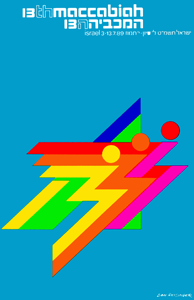
The 13th Maccabiah Games brought 4,500 athletes to Israel from 45 nations.
Eleazar Davidman was a Jewish Israeli tennis player.

The 2017 Maccabiah Games, also referred to as the 20th Maccabiah Games, were the 20th edition of the Maccabiah Games. They took place from 4 to 17 July 2017, in Israel. The Maccabiah Games are open to Jewish athletes from around the world, and to all Israeli citizens regardless of their religion. A total of 10,000 athletes competed, a Maccabiah Games record, making the 2017 Maccabiah Games the third-largest sporting competition in the world. The athletes were from 85 countries, also a record. Countries represented for the first time included the Bahamas, Barbados, Cambodia, the Cayman Islands, Haiti, Malta, Morocco, the Philippines, Singapore, South Korea, and Trinidad. The athletes competed in 45 sports.
Marty Engel was an American athlete. He competed in the men's hammer throw at the 1952 Summer Olympics.
The “2023” Maccabiah Games took place in Israel from July 14–25, 2022, and are also referred to as the 22nd Maccabiah Games. The Maccabiah Games are open to Jewish athletes from around the world, and to all Israeli citizens regardless of their religion. Israeli former Olympic judo medalist Arik Zeevi served as Maccabiah Chairman. Approximately 10,000 athletes from 80 countries competed in 42 sports categories.
